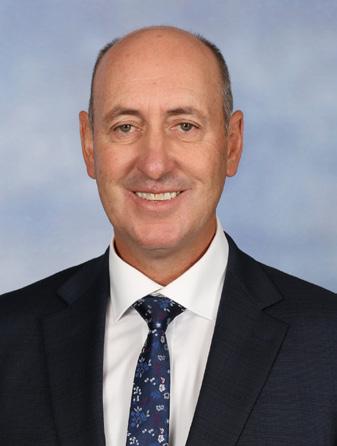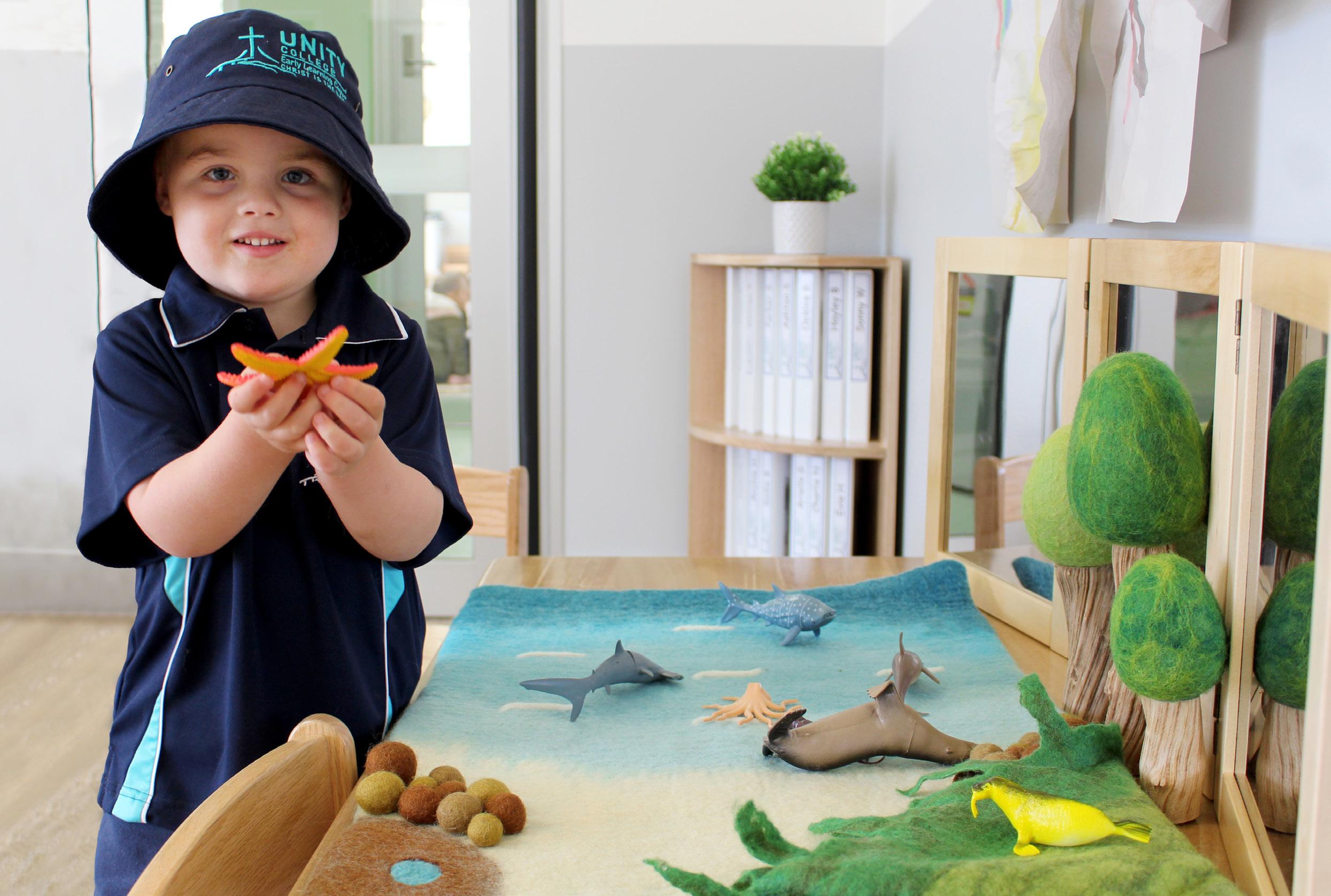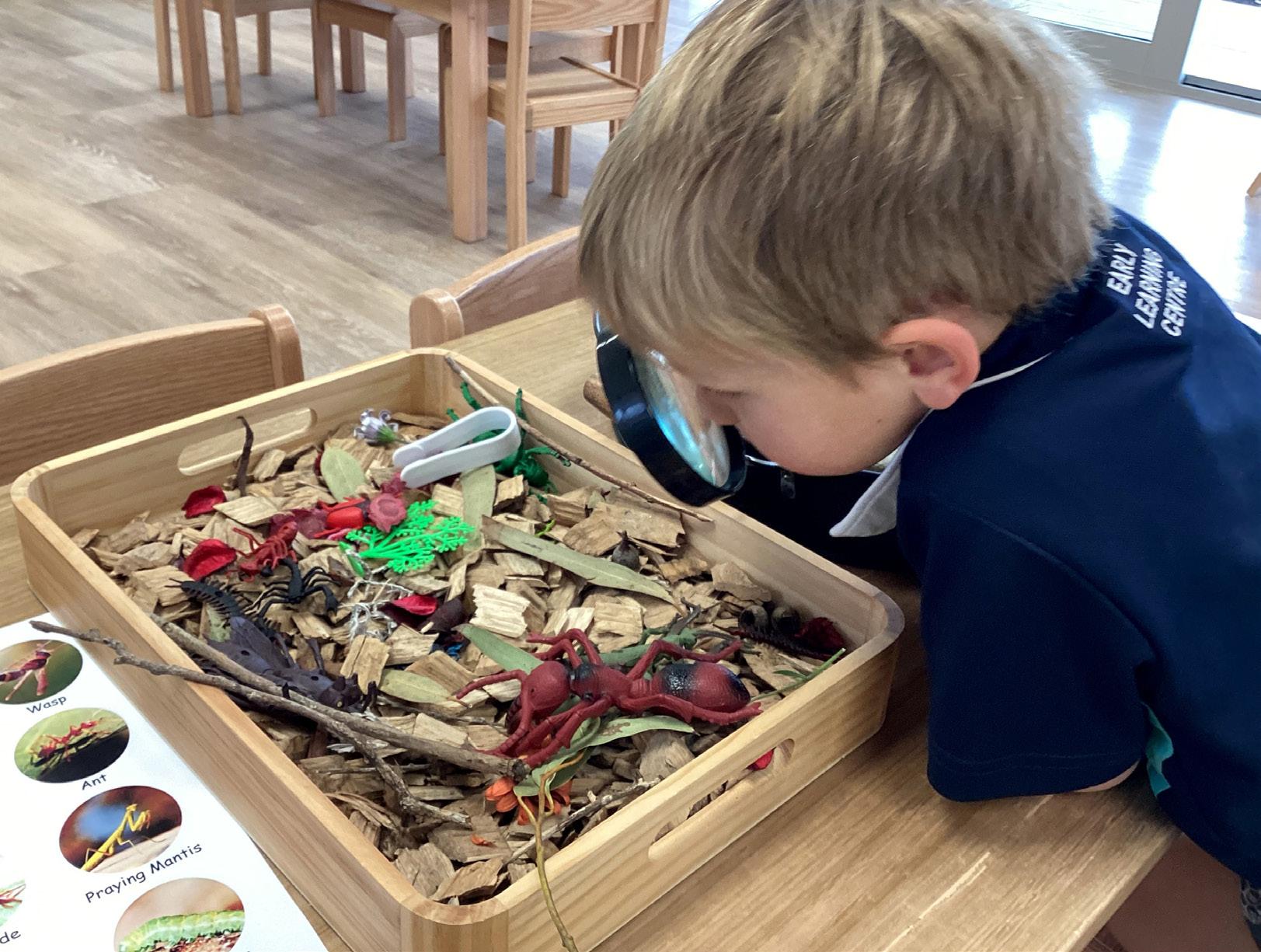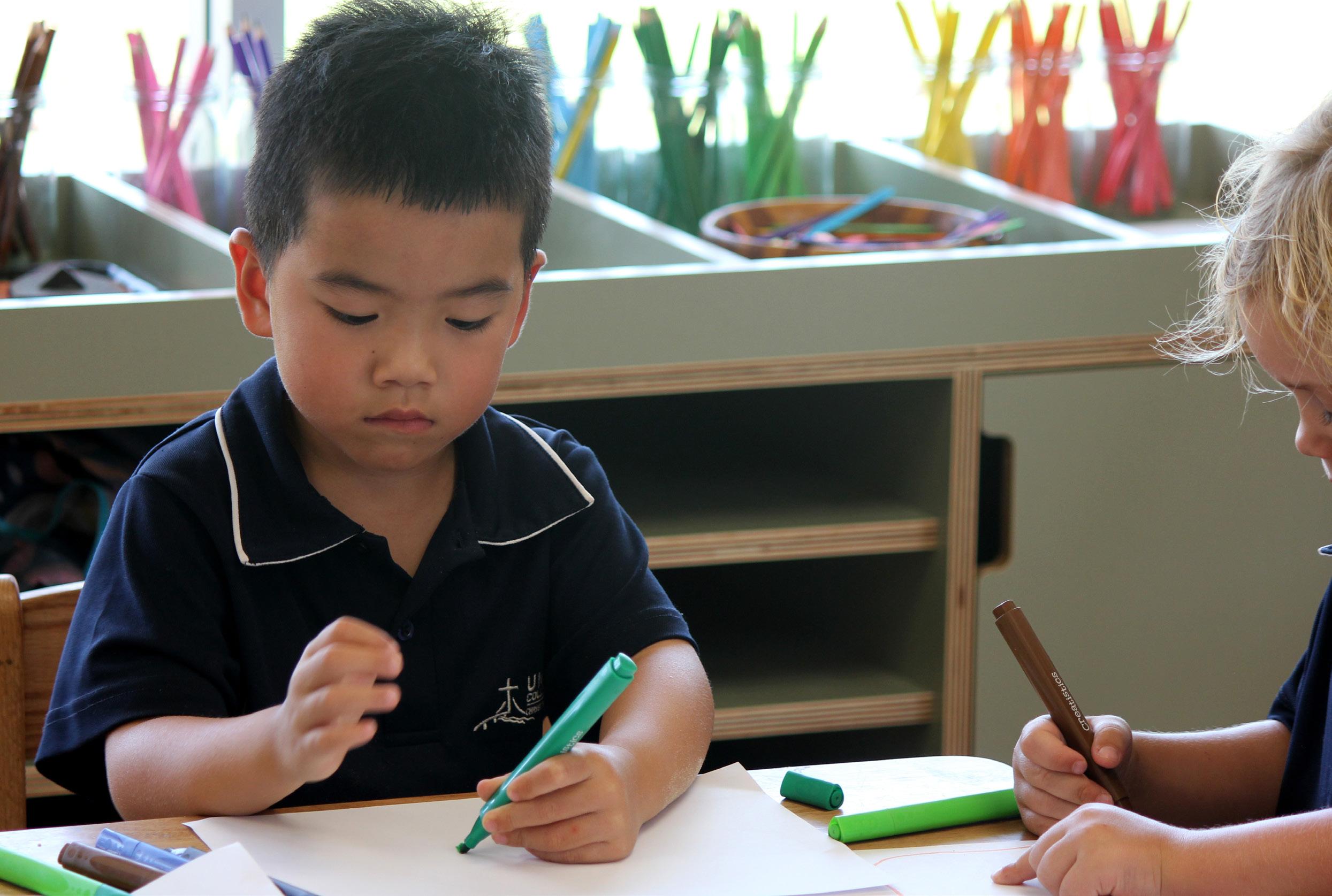









UNITY COLLEGE MURRAYLANDS PRINCIPAL
MR FRANCOIS PIENAAR
Email: fpienaar@unitycollege.sa.edu.au
Phone: 08 8532 0100
EARLY LEARNING CENTRE (ELC) DIRECTOR
MISS ALLIE CLOTHIER
Nominated Supervisor
Email: aclothier@unityelc.sa.edu.au
Phone: 08 8532 0150
UNITY COLLEGE EARLY LEARNING CENTRE RESIDES NEXT TO THE JUNIOR CAMPUS AND CATERS FOR CHILDREN AGED 2 TO 5 YEARS.
Our Early Learning Centre ensures that each child embarks on their educational journey with the best possible start.
At Unity, we uphold the belief that a child's self-competence holds utmost significance, viewing them as capable and confident learners. Our learning environment is designed to facilitate individualised learning within a secure and joyful setting. We prioritise the establishment of positive relationships with children, recognising that this enhances their confidence to inquire, explore, and take charge of their learning, guided by the Early Learning Centre teachers and educators. In partnership with families, we collaboratively undertake the responsibility of attending to every child's developmental requirements and ensuring their overall well-being.
The outdoor learning area provides diverse opportunities for children to enhance their environmental awareness, gross motor skills, and risk assessment abilities, fostering an appreciation and curiosity for the natural environment. Our approach involves play-based learning experiences tailored to nurture individual strengths, address specific needs, and explore emerging interests.
We prioritise the establishment of positive and enduring relationships with each child and their family, laying the groundwork for everyone to thrive throughout their journey at Unity College.
At Unity ELC, we recognise the paramount importance of a child’s self-concept and actively cultivate each child’s perception of themselves as competent and confident learners. In partnership with Unity College, the ELC embodies the school values outlined below.
WE LEARN WE CARE WE ENGAGE WE INVOLVE WE INSPIRE
In collaboration with families, we offer every child opportunities to cultivate a positive self-image, enhance social skills, develop emotional resilience, foster interpersonal relationships, promote independence, and instill an understanding of the needs of others. Integral to the holistic development of each child is the provision of a diverse array of experiences. Unity ELC is dedicated to addressing the needs of the whole child - socially, intellectually, emotionally, physically, and spiritually - acknowledging the interconnected nature of all aspects of human development.
+ Endeavours to advance the skill development of every child.
+ Offers carefully designed programs tailored for children aged 2 to 5 years.
+ Allows time for children to grow, explore, experiment, discover, play, love, and, above all, express their individuality in a nurturing and stimulating environment.
+ Welcomes families as an integral part of the community.
+ Establishes continuity from home to school by fostering strong partnerships with families, recognizing that a child’s learning journey commences in the home environment.
The Early Learning Centre (ELC) establishes the groundwork for the junior school through the provision of a child-directed, play-based program influenced by the Early Years Learning Framework, The Reggio Emilia philosophy, and the International Baccalaureate (IB) Primary Years Program (PYP). These educational approaches are applied within a long day care setting catering to children aged between 2 and 5 years
The ELC aims to:
+ Foster a secure, joyful, and caring environment that nurtures feelings of trust, acceptance, and belonging.
+ Act as an extension of the family unit, supporting parents in the care and upbringing of their children, and promoting family involvement in the Early Learning Centre experiences.
+ Embrace and celebrate cultural diversity, valuing the uniqueness of each family background and incorporating it into our program.
+ Cultivate feelings of self-worth, fostering emotional development through the expression of thoughts and feelings, experiencing and understanding rules and limits, and promoting kindness, justice, and empathy by recognizing and accepting emotions in others.
+ Empower children to take responsibility for their actions in self-help, health, safety, and interpersonal areas, while encouraging appropriate independence.
+ Stimulate physical development, both in large motor skills through outdoor and indoor games and activities, and in fine motor skills using manipulative equipment
Play-based learning is crucial for the development of young children. We address the innate curiosity of children by offering opportunities for them to guide their own learning through experimentation, discovery, problem-solving, and reflection. This approach cultivates a sense of optimism, openness, curiosity, and resilience in children. We employ intentional teaching techniques to stimulate children’s investigation and exploration of themselves and the broader community.
At Unity ELC we adopt inspiration from multiple Early Years pedagogies and frameworks such as:
+ The Early Years Learning Framework (EYLF)
+ The International Baccalaureate (IB) – In the Early Years
+ National Quality Framework
These frameworks and practices inspire educators to expand the scope of play-based learning for children, guiding them to implement a tailored curriculum that is pertinent to the unique characteristics of each local community and early learning environment.
The Learning outcomes from the EYLF developed In the ELC, acknowledge that children:
+ Children have a strong sense of identity
+ Children are connected with and contribute to their world
+ Children have strong sense of wellbeing
+ Children are confident and involved learners
+ Children are effective communicators
‘When children feel free to play they feel free to learn. Early Years uses the power of play to spark inquiry-based learning. With a flexible and thoughtfully designed curriculum, Early Years encourages explorations along six transdisciplinary themes’.
In the International Baccalaureate (IB) program, we embrace six play-based inquiries designed to cultivate young children’s connection to their world and culture, while simultaneously developing essential learning skills that lay a foundation for lifelong learning.
1. Who we are
2. How we express ourselves
3. How the world works
4. How we organise ourselves.

The Early Learning Centre operates from 7:00am to 6:00pm. ELC children attend the program from Monday to Friday, for 49 weeks of the year. The ELC closes for 3 weeks over the Christmas and New Year Period.
The ELC fee schedule has three options to suit all families in the community.
Parents will have access to their parent statements through the XPLOR Home App or XPLOR Home website: home.myxplor.com
Payment of Early Learning Centre fee’s are required by direct debit or credit card on a weekly basis. Parents can securely store their credit card or bank account details via the finance menu in Xplor Home App or website. Payments will be processed on Thursdays to keep the account up to date. Please note that Debit Success charge a fee of $14.95 for dishonoured payments. To avoid this default charge, please ensure funds are available in your nominated direct debit account 1 day prior to your scheduled direct debit.
Administration of overdue accounts is a time-consuming process for the Fees and Accounts team, redirecting valuable resources from school management to the detriment of operations.
Unity College Early Learning Centre maintains the right to suspend an ELC enrolment while any fees and charges are outstanding.
Four weeks’ notice of withdrawal of an enrolment from the ELC is required to be emailed to ELC Administration Office. Failing this, fees equivalent to your child’s attendance over a 4-week period will be charged in lieu of notice.
Students are allowed 42 absent days per financial year while still receiving their Government benefit payments. Families exceeding the 42 absent days within any financial year will not receive their payments once the 42 days have been used. Any absences due to illness, where a doctor’s certificate is supplied, will not be counted in the 42 “allowable absence” days provided per annual year. If your child is away due to sickness and you visit a doctor, please ask for a certificate and provide it to the ELC Administration Office so that a record of medically approved days of leave can be maintained. This is important when calculating absences from the ELC and it will impact on rebate payments if not accurate.
ELC Kindy holidays align with Unity College School holidays. Children enrolled in our kindergarten program are entitled to school holidays off, free of charge. If you choose this option, written notice is required 14 days’ prior to the end of each Term.
If your child is enrolled in our 4 year old Kindergarten Program and you do not choose to take school holidays off, their bookings will automatically continue throughout the holidays where we offer a long day care service run by qualified educators.
All ELC children can take prearranged ‘holiday leave’ which requires 14-days’ notice. This request needs to be made in writing via email. This request is to be completed two weeks prior to the holiday absence to receive 50 per cent discount off your fees for up to two weeks (pro-rata to the number of days your child attends) each financial year.
Unity College ELC is an approved care provider, enabling families to access Child Care Subsidy.
The Child Care Subsidy Scheme is designed to support families with children aged 0-13 years in sourcing financial assistance, while working, training, studying and volunteering.
The level of subsidy received by each family is determined by:
1. Combined family income
2. Activity level of both parents
3. Type of childcare service
When applying for the subsidy, families are asked to provide:
1. A combined family income that estimates the financial year.
2. The hours of recognised activity including work, training, study and volunteering.
3. The type of childcare used.
All childcare subsidy payments are given directly to the childcare provider, in this case Unity College Early Learning Centre. Families are required to pay the financial difference between the subsidy and the fee charged.
Please contact the Family Assistance Office (FAO) in 13 61 50 to register and receive a parent and child Customer Reference Number (CRN), note that there are distinct CRN details for parents and children which are required at enrolment.
For more information on this process, please visit www. education.gov.au/childcare
At times demand for long day care exceeds supply in some areas. When this occurs, it is important for services to allocate places to those families with the greatest need for support.
In accordance with The Australian Education and Care Services National Regulations, priority of access to long day care will be given to children falling in the following categories:
+ Priority 1: A child at risk of abuse or neglect
+ Priority 2: A child of a single parent who satisfies, or of parents who both satisfy, the work/training/study test under section 14 of the New Tax System (Family Assistance) Act 1999.
+ Priority 3: Any other child.
The ELC routine is flexible following the children’s ideas and interests. The day is divided into three separate blocks of time as outlined below: TIME
7:00am – 8:00am
Breakfast options are served during this time to those families who require it. Please note we stop serving breakfast at 7:45am. All children are combined at this stage.
8:00am – 3:30pm The 4 year old Kindergarten program begins and the long day care children begin their learning experiences in their appropriate room.
3:30pm – 6:00pm Our late care program with indoor and outdoor play with a late snack provided (at 5pm).
At Unity College ELC, teachers and educators actively engage in collecting information from each family to facilitate the smooth transition of children into the ELC. Our objective is to ensure a happy and positive shift between home and the ELC, fostering positive and secure connections.
Parents are urged to bring their child to a series of orientation visits scheduled for all new students before their official start date. These visits provide children with the opportunity to familiarise themselves with the new environment while having the security of their family close by.
Information about these events is communicated to all enrolled families through email.
Children are only released to their parent/guardian or to persons known to the ELC staff team nominated with authority to collect. If someone else is to collect your child, please notify the ELC Administration Officer by email or phone.
On collection of your child, the individual will be asked to produce photo identification that will be copied and kept on file.
Parents or guardians of a child that has not been collected 15 minutes after closing time will be contacted via telephone. If unavailable, your nominated emergency contact person will be telephoned and asked to collect your child.
If the child has not been collected 30 minutes after closing time, educators will contact the Early Learning Centre Director and College Principal for further action. Additional fees will be charged every minute for a child that remains in the ELC after closing time.
Every child must be signed in and out of the ELC on each day of their attendance by using the XPLOR QR code or phone number and pin on the provided iPad. This is a legal requirement and the responsibility of the parent or caregiver. These records are used in case of emergencies and are necessary for the calculation of the Child Care Subsidy (CCS).
If a child is away, unwell or on holidays, the corresponding days will be recorded on XPLOR by ELC educators and later confirmed with parents/ guardians.
If your child is unwell, or will not be attending the ELC, please advise the ELC office via email or phone.
ELC Administration Office
Miss Allison Clothier aclothier@unityelc.sa.edu.au Ph: 8532 0150
Children’s hair must be neatly and conventionally styled and retain its natural colour. Long hair must be tied back.
Unity ELC follows a “no hat, play in the shade” procedure to prioritise sun safety. Both staff and children wear sun-safe hats designed to protect their face, neck, and ears. Teachers and educators regularly check the UV rating using the Sun Smart App on a daily basis to assess the necessity of hats and sunscreen for outdoor activities. In cases where children do not have a sun-safe hat, they are directed to play in areas shielded from the sun, such as under shade, on the verandah, or indoors. Alternatively, they may be provided with a spare hat when available. This practice ensures a proactive approach to sun protection for the well-being of all individuals at Unity ELC.
We supply SPF30+ broadspectrum sunscreen every 2 hours when the UV rating is above 3. Sunscreen is stored in a cool, dry place and the use-bydate is monitored.
Families will be communicated information through several different ways. The ELC educators will communicate through Xplor with families sharing children’s learning and inquires. A fortnightly newsletter will go out to families each fortnight through Xplor capturing important dates, learning and curiosities at the ELC. The ELC will also feature in the College’s ‘Update’ magazine each Term.
We discourage children from bringing all toys to the ELC as it causes great distress when they are forgotten, lost or broken.
Families provide their child morning tea, lunch and afternoon tea in the ELC.
Breakfast is provided by the ELC each day between 7:00am – 7:45am for children arriving during those hours. A late snack is provided after 5pm for those children who remain at the ELC.
The ELC encourages families to provide children with nutritious food that is supported by National Dietary Guidelines. Please discuss specific dietary requirements with your child’s educator. When children are present at the centre with an allergy or anaphylaxis to nuts, we will be a nut free centre. This will be communicated with signage to families upon entry.
The ELC daily routine includes rest time for all children. We also enable children to rest outside of this time if required. All children may rest on a cushion or sleep on a mat with their own bed sheets provided from families. Children are offered a rest, sleep or quiet activity unless other arrangements are requested by the child’s parent or caregiver. Parents are asked to supply bed sheets for those children who require sleep.


All children are required to wear the full ELC uniform when attending. Compulsory items include:
+ ELC Polo top - purchased from ELC Campus
+ ELC Broad Brimmed Hat - purchased from ELC Campus
+ ELC Polar Fleece Jumper - purchased from www.eduthreads.com.au


Each child also requires the following items (to be purchased from your own sources):
+ Navy Pants/Shorts/Skorts
+ A named ‘nude food’ lunch box and drink bottle
+ Backpack
+ Sandshoes
+ Waterproof suit (winter months only)
Please ensure that everything your child wears or brings to school is clearly labelled with their full name.
The Early Learning Centre establishes a safe, secure, caring, and stimulating environment that fosters cooperation, enhances self-esteem, and encourages positive interactions. Acceptable behaviour is actively promoted and reinforced through positive encouragement.
In cases where a child consistently exhibits unacceptable behaviour, parents/ guardians are consulted. They are invited to collaborate with the teacher, educators, and ELC Director to ensure that behaviour guidance is consistent and clear. This collaborative approach aims to address and rectify challenging behaviours through effective communication and cooperation between all involved parties.
In the ELC, we encourage positive, co-operative behaviour by:
+ Building trust and confidence between adults and children.
+ Considering the individual stage of each child’s development.
+ Taking into account the unique interests, strengths, and abilities of every child.
+ Demonstrating sensitivity to the child’s background.
+ Investigating the reasons behind behaviours that require redirection.
+ Engaging with the child at their level to establish effective communication.
+ Utilising positive, clear, and developmentally appropriate language for each child.
+ Maintaining consistency with behavioural expectations.
+ Encouraging children to express sympathy for individuals facing difficulties.
+ Providing clear alternatives that enhance children’s decision-making abilities.
+ Acting as positive role models for the children and employing calm communication.
National Law and National Regulations set the ‘National Quality Framework for Early Childhood Education and Care’. ‘The Australian Children’s Education and Care Quality Authority (ACECQA), oversee this ‘National Quality Framework’ (NQF). Long Day Care, Family Day Care, Pre-School Kindergarten and Out of School Hours Care in all states and Territories (other than WA) are required to comply with the National Law, which gives effect to the National Quality Framework.
The National Quality Framework comprises Seven National Quality Standards (NQS), utilised by services to self-assess their current practices, identify areas for quality improvement, and strategically plan for effective implementation of these enhancements. Ongoing assessments of each service are conducted by Regular Authorities, who bear the primary responsibility for service approval, monitoring, and quality assessment.
The Quality Areas are:
+ Educational program and practice
+ Children’s health and safety
+ Physical environment
+ Staffing arrangements
+ Relationships with children
+ Collaborative partnerships with families and communities
+ Leadership and service management.
To view a copy of our Grievance Policy for addressing matters of significant concern, please see the ELC Director.
If you have a grievance, the initial point of contact is your child’s educator. If the issue cannot be resolved at this level, more formal procedures may be appropriate. The overarching goal of any grievance procedure is to discuss and resolve matters within a framework of cooperation, emphasising resolution and the prevention of further disputes through the cultivation of positive relationships.
In cases where the grievance is deemed serious, subsequent steps may be bypassed, and the matter can be escalated to the attention of the ELC Director, Head of Junior School or College Principal.
All grievances are treated with utmost seriousness, and dedicated efforts are made to resolve them. The outcomes of the resolution process are thoroughly discussed with the concerned parents.
Regular fire evacuation and invacuation drills are held at Unity College ELC. In an evacuation children are evacuated across the ELC grounds to the school oval. In an invacuation, children go to their learning spaces and all doors, windows are locked as well as all other doors and windows in the ELC. In the event of an evacuation or invacuation, each child’s presence is checked against the attendance list on Xplor on the ipads. This highlights the importance of parents and caregivers signing children in and out each day on Xplor.
Precautions against the spread of colds, viral infections, and contagious diseases are essential.
Parents are required to keep children home if they are running a temperature or showing any signs of sickness. Children who have had vomiting or diarrhoea should remain at home for at least 24 hours after the last episode.
Medication should be scheduled out of ELC hours, wherever possible. If medication is required during ELC hours, please complete a ‘Request for Medication Administration’ form available from the child’s educator or ELC Director.
Medication must be stored in original container and clearly labelled with the students name, identification of medicine, required dosage and instructions from a doctor or pharmacist for administration.
The ELC aims to minimise the spread of potentially infections diseases between children, their families and staff by excluding children who may have an infections disease or who are too unwell to attend the ELC. We do so by:
+ Maintaining accurate and up to date immunisation records.
+ Ensuring staff and families are aware of our ‘Infectious Diseases Policy’.
+ Informing staff and families of outbreaks of infectious diseases and notifiable diseases.
+ Informing the Commissioner of Health at SA Health Authorities, if an outbreak of a notifiable disease occurs.
Please notify the ELC Administration Office or ELC Director if your child contracts an infectious disease.
The South Australian Public Health Act (2011) states that children cannot enrol in or attend early childhood services unless all immunisation requirements are met.
Your child’s Immunisation records will be required during the enrolment process before your child can attend the Early Learning Centre. An approved immunisation record must be an ‘Immunisation History Statement’ which is downloaded from the Australian Immunisation Register (AIR). A letter from a GP, overseas immunisation record, or the South Australian Child Health and Development Record (blue book) are not considered approved immunisation records.
The Child Care Subsidy (CCS) applies to children who are fully immunised. This initiative ensures parents are reminded of the importance of immunising their children at each of the milestones.


